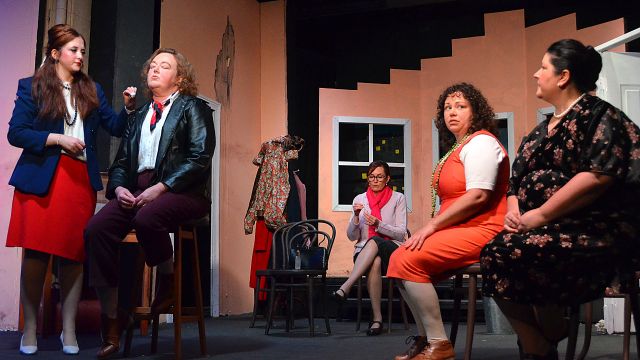The Revlon Girl
The clocks stopped at 9.13am on the morning of 21 October 1966, when a 34 metre high colliery spoil tip suddenly slid downhill and engulfed the Junior School and a row of houses. The 5,000-strong village of Aberfan lost 116 children and 28 adults that day.
That awful tragedy, the result of greed, corruption and ignored regulations, changed the lives of everyone in the village – and the parents of those dead children had to carry on. The fathers were almost certainly back underground at the coalmine that created the tip; the mothers left on the surface, trying to make sense of what happened.
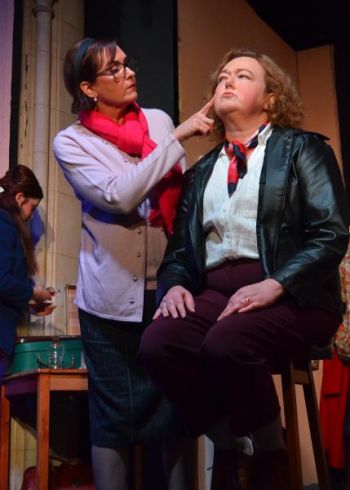
Some of these mothers gather in the leaky room above the pub to meet – to talk, or just to have a cup of tea – but tonight, eight months after the disaster, they’ve invited a young woman from Revlon cosmetics to come and demonstrate her products. The women haven’t had much time for make-up in the months following the disaster, so this would be a good distraction.
Director Olivia Jane Parker has taken Neil Anthony Docking’s Olivier-nominated play and presented an intimate and powerfully moving story of women dealing with pain and loss, each in their own ways.
Parker has chosen to present the play with two casts, alternating performances throughout the season, and promises to give two different interpretations of the play through the two groups of performers. Opening night was the ‘Stormy Rose’ cast, which will be followed by the ‘Sassy Mauve’ cast – both named after Revlon lipstick colours.
Parker and her cast have created incredibly detailed characters, with the play allowing them to strip back their protection a little, to reveal still more depth beneath. Each performer embodies a different approach to grief, and whilst the horror that caused it is the same, they have become very different people since.
Certainly for the Stormy Rose performers, they are very well cast and work well as individuals and convincing as a group of women who might not usually be friends but for their common tragedy.
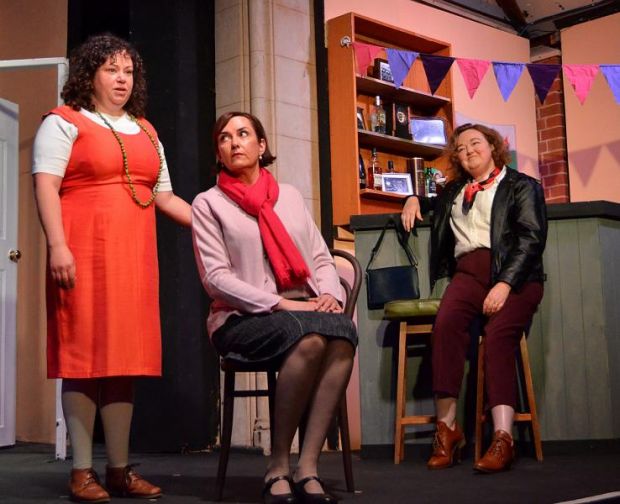
Brooke DuBois is Sian, who busies herself with the minutiae of the room, putting on a brave face and doing her best to distract herself and the others. DuBois is excellent as a woman trying to hold it all together, and not just for herself.
Megan Harris is the sensitive Marilyn (and the off-stage Jackie) – she deals with her grief very differently, looking to logic, sometimes blame, to make sense of it all. Harris is haunting as a quiet woman desperately trying to hold onto a normal life.
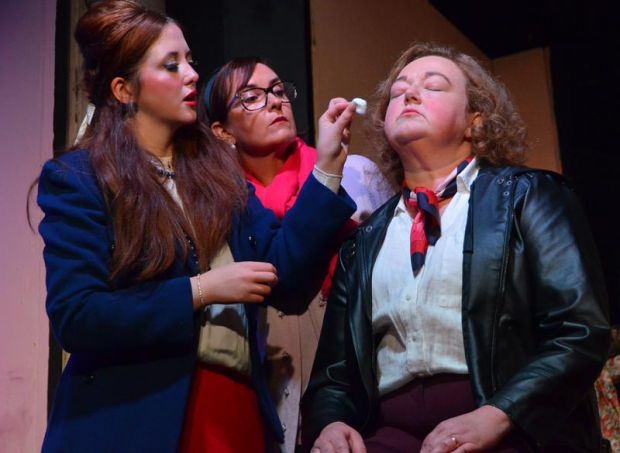
Heather Crawford has the best entrance as Rona, who opts to replace her cup of tea with something much stronger. Crawford is fierce and committed as a mother angry with everyone, and beautifully brings Rona’s humour through her tough exterior.
Olivia Bigham is Jean, the preacher’s wife who is handling the practicalities of what happens now: how to spend the memorial fund that’s growing quickly from a nation’s sympathy, sitting on committees to make all kinds of decisions. Bingham gives Jean severity and superiority, with a sprinkling of sarcasm and humour.
Lucy Grace is the outsider, the Revlon Girl definitely not from the Welsh Valleys, and delivers an understated performance in the first act, her clipped English tones consumed by the louder Welsh voices that clamour over her. Yet after the interval, Grace’s body and voice assert themselves and she is powerful in delivering her character’s own story.
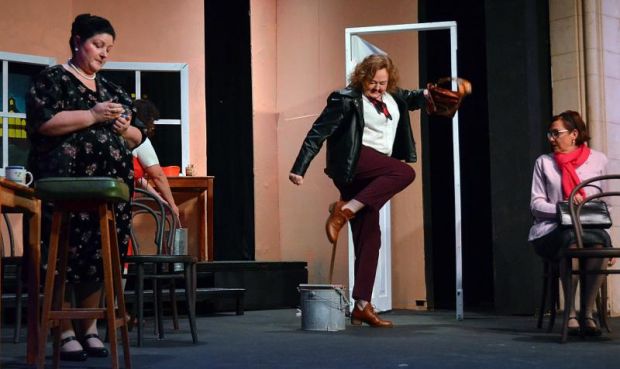
This is where the play really succeeds: in the slow removal of the masks that each of the women wear to protect themselves. It’s a brilliant and well-paced transition from the public image of calm and polite to unfiltered anger, frustration and devastating sadness. It’s a wonderful achievement from Parker and her cast to show that journey from one to the other, and it’s utterly heart-breaking to share each woman’s personal story.
Accent coach Elaine Latcham has clearly worked hard with the cast to perfect their Welsh accents – Dubois and Crawford are particularly strong – and with my own half-Welsh heritage listening, there was no distraction from anyone’s dialect or tone.
The single set, designed by Leah Klemm and lovingly constructed as always by Don Oakley and his crew, serves to frame the performers, giving them the space to move or take refuge, whether that’s behind the bar, staring from the upstairs window, or examining the wobbly leg of a wooden chair.
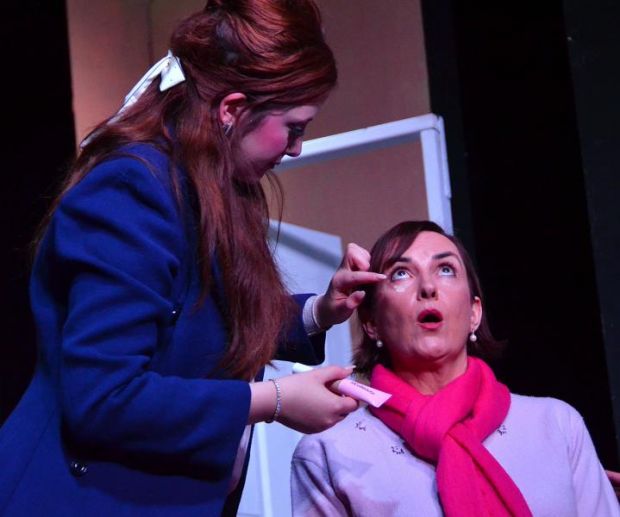
The sound design, from assistant director Sophie Waller, director Parker and Thomas Batten, is just right: not least with the spine-tingling voices of the real Ynysowen Male Voice Choir that permeates the audience. The choir from the Welsh Valleys was formed by the men trying to repair their broken community and it’s a touching inclusion that complements what the women are experiencing on stage.
There is a surprising amount of laughter from this play – clearly an essential release valve for the real mothers, it’s also welcomed by the audience, to balance the intense emotions that we’re feeling in response to the actors’ telling of their characters’ stories.
It would be wonderful to see how the Sassy Mauve cast present this differently – I’m positive that Ruby Patrich, Georjette Mercer, Carmine Clarke, Olivia Richardson and Jade Cooper will be just as fantastic as their counterparts in Stormy Rose.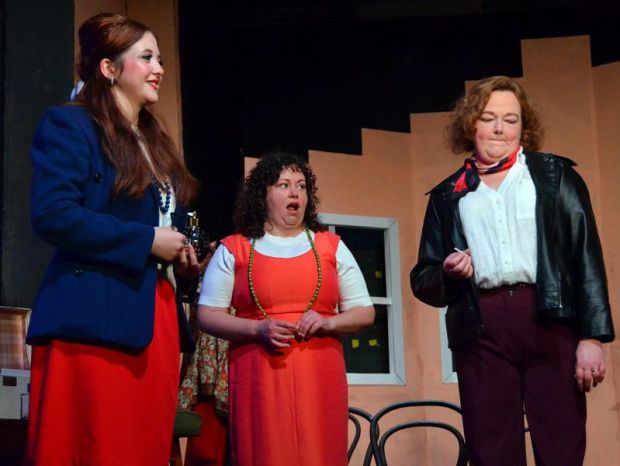
Parker and these two groups of performers have shaped a heartfelt exploration of handling past grief with their future lives, and even without the emotional or familial connection to a disaster in Old South Wales, you will feel this in your heart for a long time after the end of the show.
Review by Mark Wickett
Photographer: Les Zetlein
Subscribe to our E-Newsletter, buy our latest print edition or find a Performing Arts book at Book Nook.

